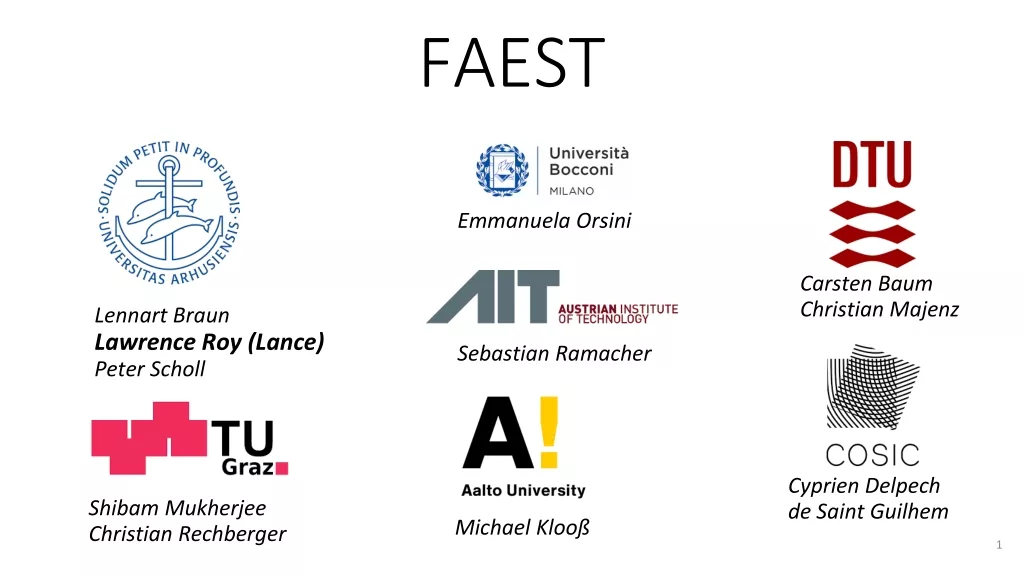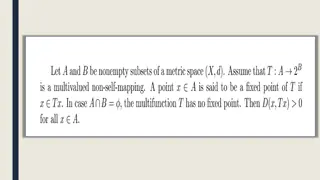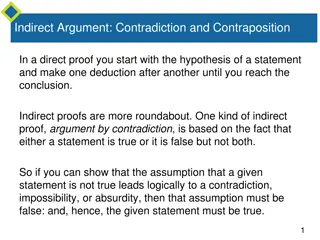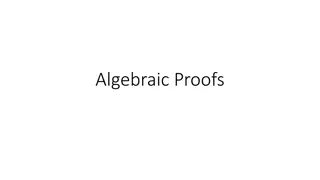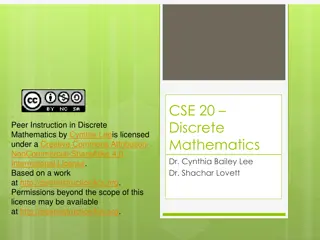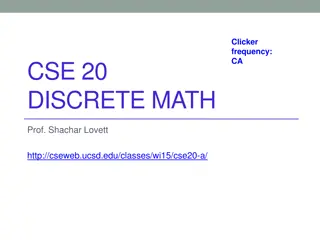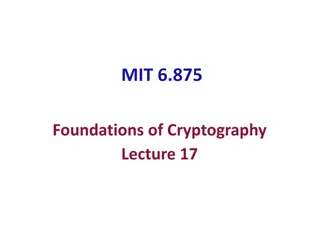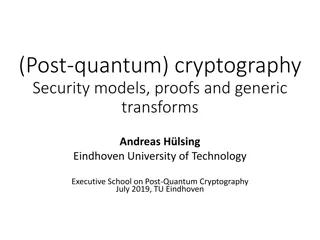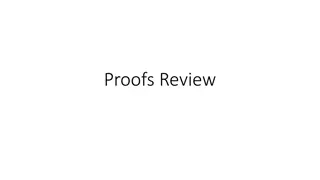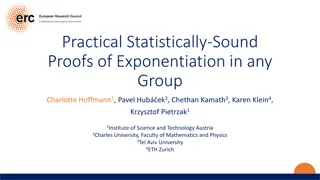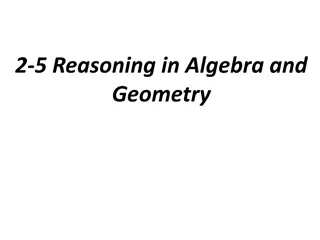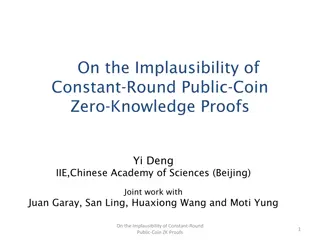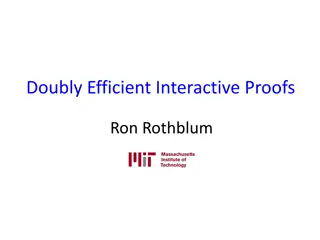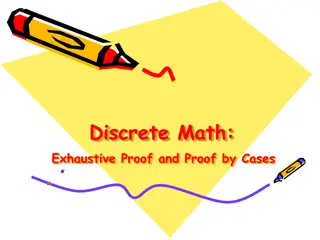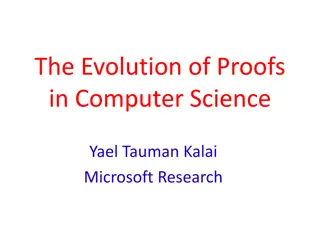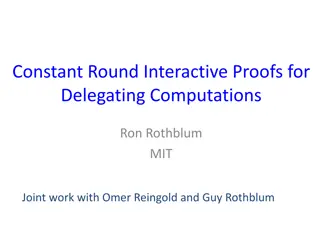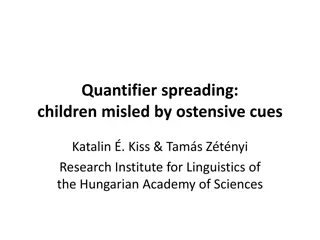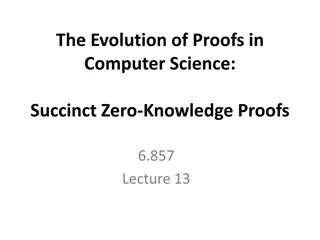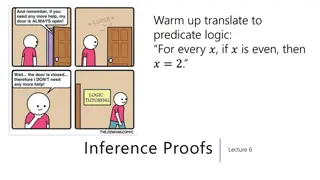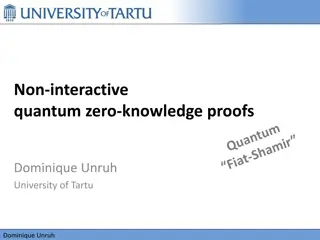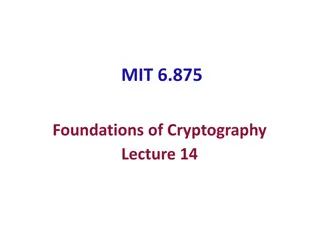Quantifier Proofs, English Proofs
Learn how to apply the Direct Proof Rule in quantifier proofs with English proofs. Incorrect proofs are corrected by introducing assumptions and using inference rules such as Modus Ponens. Follow the steps outlined to successfully demonstrate the implications in the given statements.
Download Presentation

Please find below an Image/Link to download the presentation.
The content on the website is provided AS IS for your information and personal use only. It may not be sold, licensed, or shared on other websites without obtaining consent from the author.If you encounter any issues during the download, it is possible that the publisher has removed the file from their server.
You are allowed to download the files provided on this website for personal or commercial use, subject to the condition that they are used lawfully. All files are the property of their respective owners.
The content on the website is provided AS IS for your information and personal use only. It may not be sold, licensed, or shared on other websites without obtaining consent from the author.
E N D
Presentation Transcript
Quantifier Proofs, English Proofs CSE 311 Spring 22 Lecture 8
The Direct Proof Rule Write a proof given ? conclude ? ? ? Direct Proof rule ? ? ? ? This rule is different from the others ? ?is not a single fact. It s an observation that we ve done a proof. (i.e. that we showed fact ? starting from ?.) We will get a lot of mileage out of this rule starting today!
Given: ((? ?) (? ?)) Show: (? ?) Here s an incorrect proof. Given Eliminate (1) Eliminate (1) Given??? Modus Ponens 4,2 Modus Ponens 5,3 Direct Proof Rule 1. ? ? ? ? 2. ? ? 3. ? ? 4. ? 5. ? 6. ? 7. ? ?
Given: ((? ?) (? ?)) Show: (? ?) Here s an incorrect proof. Given Eliminate 1 Eliminate (1) Given ???? Modus Ponens 4,2 Modus Ponens 5,3 Direct Proof Rule Proofs are supposed to be lists of facts. Some of these facts aren t really facts 1. ? ? ? ? 2. ? ? 3. ? ? 4. ? These facts depend on ?. But ?isn t known generally. It was assumed for the purpose of proving ? ?. 5. ? 6. ? 7. ? ?
Given: ((? ?) (? ?)) Show: (? ?) Here s an incorrect proof. Given Eliminate 1 Eliminate (1) Given ???? Modus Ponens 4,2 Modus Ponens 5,3 Direct Proof Rule Proofs are supposed to be lists of facts. Some of these facts aren t really facts 1. ? ? ? ? 2. ? ? 3. ? ? 4. ? These facts depend on ?. But ?isn t known generally. It was assumed for the purpose of proving ? ?. 5. ? 6. ? 7. ? ?
Given: ((? ?) (? ?)) Show: (? ?) Here s a corrected version of the proof. Given Eliminate 1 Eliminate 1 Assumption Modus Ponens 4.1,2 Modus Ponens 4.2,3 1. ? ? ? ? When introducing an assumption to prove an implication: Indent, and change numbering. 2. ? ? 3. ? ? 4.1 ? 4.2 ? 4.3 ? When reached your conclusion, use the Direct Proof Rule to observe the implication is a fact. Direct Proof Rule 5. ? ? The conclusion is an unconditional fact (doesn t depend on ?) so it goes back up a level
Try it! Given: ? ?, ? ? ?, ?. Show: ? ?
Try it! Given: ? ?, ? ? ?, ?. Show: ? ? 1. ? ? 2. ? ? ? 3. ? 4.1 ? 4.2 ? ? 4.3 ? 4.4 ? ? 4.5 ? 5. ? ? Given Given Given Assumption Intro (3,4.1) Modus Ponens (2, 4.2) Commutativity (1) Eliminate (4.4, 4.3) Direct Proof Rule
Inference Rules ? ? ? ? Eliminate Direct Proof rule ?,? ? ? ? ?, ? ? ?;? Eliminate Modus Ponens ? ? ?;? Intro You can still use all the propositional logic equivalences too! ? ? ? Intro ? ?,? ?
Proofs with Quantifiers We ve done symbolic proofs with propositional logic. To include predicate logic, we ll need some rules about how to use quantifiers. ? ?(?) Eliminate ?(?) for some ? Intro ? ?(?) ? ? for any ? ? ? ;? is arbitrary arbitrary ??(?) Eliminate Intro ?(?) for a fresh fresh ? ? ?(?) Let s see a good example, then come back to those arbitrary and fresh conditions.
Proof Using Quantifiers Suppose we know ??(?) and ?[ ? ? ? ? ]. Conclude ??(?). ?(?) for some ? ? ?(?) Intro Eliminate ? ?(?) ? ? for any ? ? ? ;? is arbitrary arbitrary ??(?) Eliminate Intro ?(?) for a fresh fresh ? ? ?(?)
Proof Using Quantifiers Suppose we know ??(?) and ?[ ? ? ? ? ]. Conclude ??(?). ?(?) for some ? Intro ? ?(?) ??(?) Eliminate ?(?) for a fresh fresh ? ? ?(?) Eliminate ? ? for any ? ? ? ;? is arbitrary arbitrary Intro ? ?(?)
Proof Using Quantifiers Suppose we know ??(?) and ?[ ? ? ? ? ]. Conclude ??(?). ?(?) for some ? Given Eliminate 1 Given Eliminate 3 Modus Ponens 2,4 Intro 5 1. ??(?) 2. ?(?) 3. ?[? ? ? ? ] 4. ? ? ?(?) 5. ?(?) 6. ??(?) Intro ? ?(?) ??(?) Eliminate ?(?) for a fresh fresh ? ? ?(?) Eliminate ? ? for any ? ? ? ;? is arbitrary arbitrary Intro ? ?(?)
Proofs with Quantifiers We ve done symbolic proofs with propositional logic. To include predicate logic, we ll need some rules about how to use quantifiers. ? ?(?) Eliminate ?(?) for some ? Intro ? ?(?) ? ? for any ? ? ? ;? is arbitrary arbitrary ??(?) Eliminate Intro ?(?) for a fresh fresh ? ? ?(?) arbitrary means ?is just a variable in our domain. It doesn t depend on any other variables and wasn t introduced with other information.
Proofs with Quantifiers We ve done symbolic proofs with propositional logic. To include predicate logic, we ll need some rules about how to use quantifiers. ? ?(?) Eliminate ?(?) for some ? Intro ? ?(?) ? ? for any ? ? ? ;? is arbitrary arbitrary ??(?) Eliminate Intro ?(?) for a fresh fresh ? ? ?(?) fresh means ?is a new symbol (there isn t another ? somewhere else in our proof).
Fresh and Arbitrary Suppose we know ?? ? . Can we conclude ?? ? ? ?(?) for some ? Given Eliminate (1) Intro (2) Intro 1. ? ? ? ? ?(?) 2. ?(?) ??(?) 3. ? ?(?) Eliminate ?(?) for a fresh fresh ? This proof is definitely (take ?(?)to be is a prime number ) definitely wrong. ? ?(?) Eliminate ? ? for any ? ?wasn t arbitrary. arbitrary. We knew something about it it s the ? that exists to make ? ? true. ? ? ;? is arbitrary arbitrary Intro ? ?(?)
Fresh and Arbitrary ? ? ;? is arbitrary arbitrary ??(?) Eliminate Intro ?(?) for a fresh fresh ? ? ?(?) You can trust a variable to be arbitrary If you eliminated a to create a variable, that variable is arbitrary. Otherwise it s not arbitrary it depends on something. arbitrary if you introduce it as such. You can trust a variable to be fresh anywhere else (i.e. just use a new letter) fresh if the variable doesn t appear
Fresh and Arbitrary ?(?) for some ? ? ?(?) Intro Eliminate ? ?(?) ? ? for any ? There are no similar concerns with these two rules. Want to reuse a variable when you eliminate ? Go ahead. Have a ? that depends on many other variables, and want to intro ? Also not a problem.
Arbitrary In section, you said: ? ? ? ?,? [ ? ? ? ?,? ]. Let s prove it!!
Arbitrary In section, you said: ? ? ? ?,? [ ? ? ? ?,? ]. Let s prove it!! 1.1 ? ? ? ?,? 1.2 ? ? ?,? 1.3 Let ? be arbitrary. 1.4 ?(?,?) 1.5 ? ? ?,? 1.6 ? ? ?(?,?) 2. ? ? ? ?,? Assumption Elim (1.1) -- Elim (1.2) Intro (1.4) Intro (1.5) Direct Proof Rule [ ? ? ?(?,?)]
Arbitrary In section, you said: ? ? ? ?,? [ ? ? ? ?,? ]. Let s prove it!! 1.1 ? ? ? ?,? 1.2 ? ? ?,? 1.4 ?(?,?) 1.5 ? ? ?,? 1.6 ? ? ?(?,?) 2. ? ? ? ?,? Assumption Elim (1.1) It is not required to have variable is arbitrary as a step before using it. But many people (including Robbie) find it helpful. Elim (1.2) Intro (1.4) Intro (1.5) Direct Proof Rule [ ? ? ?(?,?)]
Find The Bug Let your domain of discourse be integers. We claim that given ? ?Greater ?,? , we can conclude ? ?Greater(?,?) Where Greater(?,?) means ? > ? Given -- Elim (1) Elim (2) Intro (4) Intro (5) 1. ? ? Greater ?,? 2. Let ? be an arbitrary integer 3. ?Greater(?,?) 4. Greater(?,?) 5. ? Greater(?,?) 6. ? ? Greater(?,?)
Find The Bug Given -- Elim (1) Elim (2) Intro (4) Intro (5) 1. ? ? Greater ?,? 2. Let ? be an arbitrary integer 3. ?Greater(?,?) 4. Greater(?,?) 5. ? Greater(?,?) 6. ? ? Greater(?,?) ? is not a single number! The variable ? depends on ?.You can t get rid of ? while ? is still around. What is ?? It s probably something like ? + 1.
Bug Found There s one other hidden requirement to introduce . No other variable in the statement can depend on the variable to be generalized Think of it like this -- ? was probably ? + 1 in that example. You wouldn t have generalized from Greater(? + 1,?) To ?Greater(? + 1,?). There s still an ?, you d have replaced all the ? s. ? depends on ? if ? is in a statement when ? is introduced. This issue is much clearer in English proofs, which we ll start next time.
Whats Next We re taking off the training wheels! Our goal with writing symbolic proofs was to prepare us to write proofs in English. Let s get started. The next 3 weeks: Practice communicating clear arguments to others. Learn new proof techniques. Learn fundamental objects (sets, number theory) that will let us talk more easily about computation at the end of the quarter.
Even Warm-up An integer ? is even if (and only if) there exists an integer ?, such that ? = ??. Let your domain of discourse be integers. Let Even ? = ?(? = 2?). Prove if ? is even then ?2is even. Write a symbolic proof (with the extra rules Definition of Even and Algebra ). Then we ll write it in English. What s the claim in symbolic logic? ?(Even ? Even ?2)
If ? is even, then ?2 is even. 1. Let ? be arbitrary 2.1Even(?) 2.2 ? (2? = ?) 2.3 2? = ? 2.4 ?2= 4?2 2.5 ?2= 2 2?2 2.6 ?(2? = ?2) 2.7 Even(?2) 3. Even ? Even(?2) 4. ?(Even ? Even(?2)) Assumption Definition of Even (2.1) Elim 2.2 Algebra (2.3) Alegbra (2.4) Intro (2.5) Definition of Even Direct Proof Rule (2.1-2.7) Intro (3)
If ? is even, then ?2 is even. 1. Let ? be arbitrary 2.1Even(?) 2.2 ? (2? = ?) 2.3 2? = ? 2.4 ?2= 4?2 2.5 ?2= 2 2?2 2.6 ?(2? = ?2) 2.7 Even(?2) 3. Even ? Even(?2) 4. ?(Even ? Even(?2)) Let ? be an arbitrary even integer. By definition, there is an integer ? such that 2? = ?. Assumption Definition of Even (2.1) Elim 2.2 Algebra (2.3) Alegbra (2.4) Intro (2.5) Definition of Even Direct Proof Rule (2.1-2.7) Intro (3) Squaring both sides, we see that ?2= 4?2= 2 2?2. Because ? is an integer, 2?2 is also an integer, and ?2 is two times an integer. Thus ?2 is even by the definition of even. Since ? was an arbitrary even integer, we can conclude that for every even ?, ?2 is also even.
Converting to English Start by introducing your assumptions. Introduce variables with let. Introduce assumptions with suppose. Always state what type your variable is. English proofs don t have an established domain of discourse. Don t just use algebra explain what s going on. We don t explicitly intro/elim / so we end up with fewer dummy variables Let ? be an arbitrary even integer. By definition, there is an integer ? such that 2? = ?. Squaring both sides, we see that ?2= 4?2= 2 2?2. Because ? is an integer, 2?2 is also an integer, and ?2 is two times an integer. Thus ?2 is even by the definition of even. Since ? was an arbitrary even integer, we can conclude that for every even ?, ?2 is also even.
Why English Proofs? Those symbolic proofs seemed pretty nice. Computers understand them, and can check them. So what s up with these English proofs? They re far easier for people But instead of a computer checking them, now a human is checking them. people to understand.
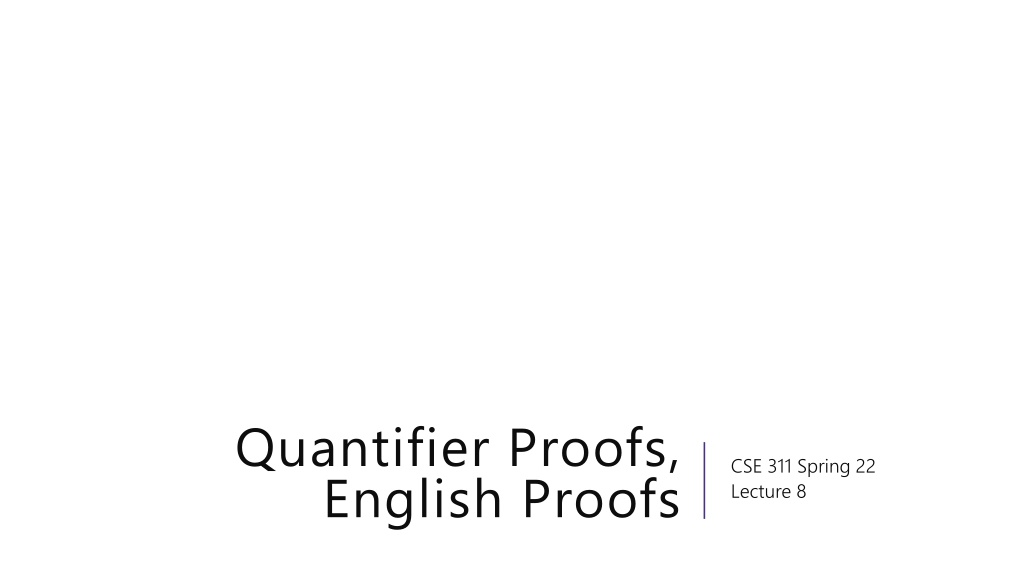
 undefined
undefined


